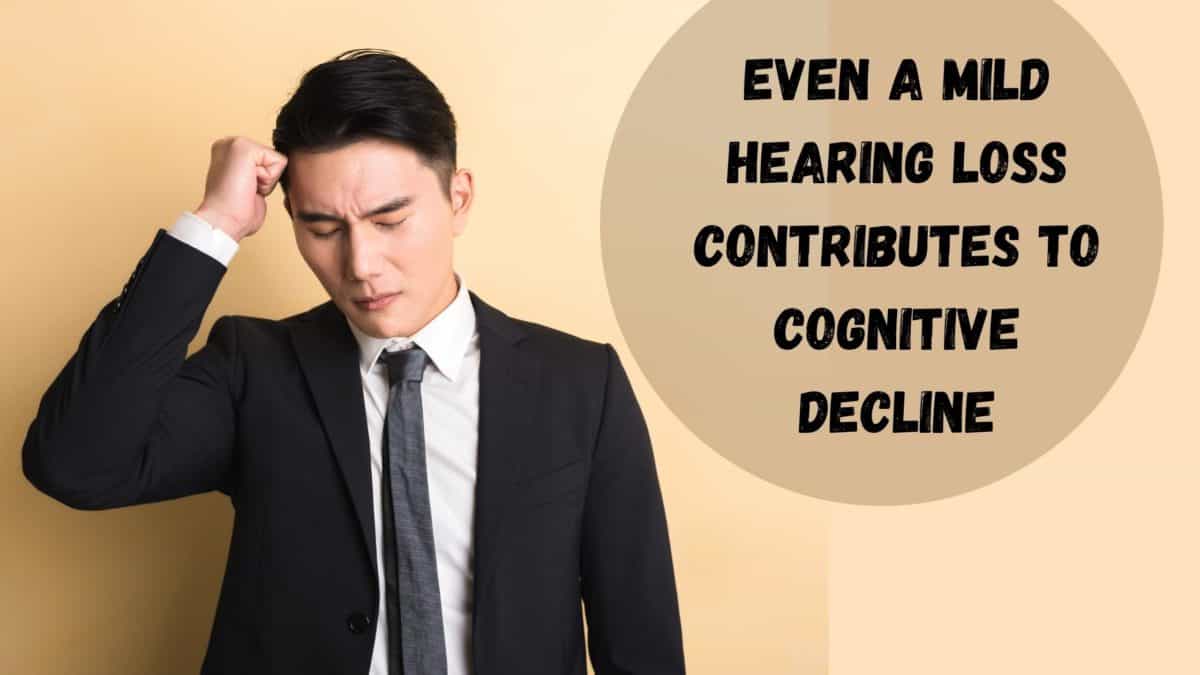- Understanding the Connection Between Tinnitus and Weather - May 17, 2025
- The Most Unexpected Reasons Hearing Aids Can Malfunction - May 9, 2025
- How OAE Testing Unveils Hidden Hearing Loss - April 15, 2025
Hearing loss impacts everyone in different ways. For some, hearing loss can affect low sounds, while others experience high-frequency hearing loss that affects high sounds. Most people with hearing loss have a harder time following conversations, as well as having more difficulty hearing when there’s a lot of background noise.
Hearing loss is also linked to cognitive decline. In fact, even mild hearing loss can contribute to cognitive decline, increasing the risk of dementia or Alzheimer’s disease.
What is Cognitive Decline?
Cognitive decline simply means changes in your brain. One of the most common examples of cognitive decline is changes in memory or memory loss. Cognitive decline can also make it difficult to learn new things or think through all your options. Eventually, cognitive decline can make it hard to do routine tasks like getting dressed or making breakfast.
Here are some signs that you or a loved one could be experiencing cognitive decline:
- Forgetting recent events
- Forgetting important facts or important dates you’ve always remembered
- Struggling to learn new things, or having to learn things a few times before it sticks
- Taking a long time to do things that used to be easy
- Feeling overwhelmed whenever you have to think through several options
- Having difficulty planning your day
Some cognitive decline can be a natural part of aging. After a lifetime on the go, we naturally slow down a bit. However rapid cognitive decline is linked to dementia or Alzheimer’s disease.
How Hearing Loss Can Contribute to Cognitive Decline
A study from the Columbia University Irving Medical Center looked at how hearing loss can contribute to hearing loss. They had over 6,400 participants in their study, all aged 50 and older. They had each participant take a hearing test and do a cognitive test. What they found is that participants who had hearing loss had a higher chance of having cognitive decline. Overall, the adults with hearing loss had lower scores on the cognitive test.
However, what’s interesting about this study is that even adults with mild hearing loss were more likely to have lower scores on cognitive tests. Even mild hearing loss contributes to cognitive decline. Even if your hearing loss isn’t too serious, it can still be having a major effect on your brain and your cognitive abilities.
What Does Hearing Loss Have to Do with Your Brain?
Hearing doesn’t just happen in your ears. Hearing starts in your ears but ends in your brain. The auditory regions of your brain receive all signals from the ears, interpret the signals, and put together a complete picture of the sounds around you. If you have hearing loss, even mild hearing loss, your brain is under a lot more strain. Your brain has to work harder to piece together all the sounds and fill in any missing gaps in information. Other areas of the brain also get roped into helping you hear. For example, your logic and reasoning get involved, picking up on other cues and interpreting the things you hear.
Hearing loss can be exhausting. You spend so much energy straining to hear that you might not have enough energy to interpret what you heard, consolidate the information so that it makes sense, or store the information in your memory. “People with worse hearing use so much more brainpower to decode the words that are said, and they don’t get to process the meaning of what was said.” explains the study’s author Dr. Justin Golub.
Even Mild Hearing Loss is Bad for Your Brain
The study found that even mild hearing loss can lead to cognitive decline. Mild hearing loss is often hard to spot at first, which is why regular hearing tests are so important. If you’re over 60, we recommend annual hearing tests to monitor your hearing health. When we detect mild hearing loss you can treat your hearing loss right away. You’ll benefit from better hearing, and you’ll be doing the right thing for your cognitive health too.
Visit us today for a comprehensive hearing test. Find out more about your hearing health and your cognitive health! Then explore your hearing aid options. We’ll help you find devices that will help you hear when you need an extra boost.

